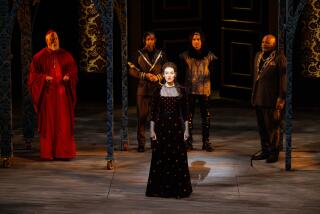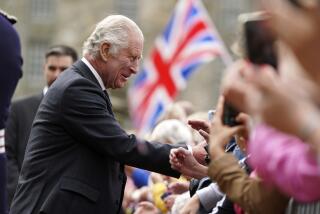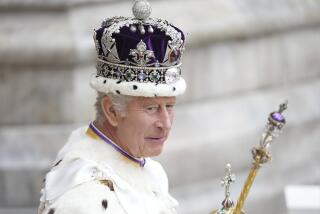Henry VIII: A Revisionist Look at a Renaissance Man : History: Henry’s 500th anniversary coincides with a reappraisal of the monarch’s reign that is shaking up the hallowed halls of academia.
- Share via
LONDON — Stout splayed legs. Full broad figure festooned in finery. Replumed head balanced on a stubby neck. Face framed by a thick beard, with small shrewd eyes fixed in a withering gaze.
The description can only be that of one historical character: King Henry VIII.
Few individuals from the past conjure up such a vivid image, not just in England, the country where he reigned, but around the globe. For sheer notoriety alone, it’s not surprising that this year, the 500th anniversary of the monarch’s birth, is being celebrated.
Britain is, however, commemorating the man for another reason. This 500th anniversary coincides with a significant reappraisal of Henry that is shaking up the hallowed halls of academia.
Until now, the Tudor king’s claim to fame--or infamy--rested largely on his propensity for wives, coupled with a much ballyhooed break with the Roman Catholic Church.
No longer, the revisionist thinking goes. If viewed according to the values of his own age, Henry’s concern to produce an heir at whatever cost would have been seen by his contemporaries as a highly appropriate preoccupation for a man in his position.
As for destroying monasteries and establishing the Anglican faith with himself as its head--this, too, contains no contradiction with 16th-Century ideas about the “divine” origin and primacy of kingship, and with a widespread distaste for the corruption that was rife in the medieval church.
Such arguments are part of a growing movement among British historians--led by one of the country’s top Tudor scholars, David Starkey--to cut through the hype and folly to see Henry for what he was: a complex personality combining vice and virtue, but, most vitally, displaying all the characteristics of a Renaissance man of the first order.
Meeting David Starkey at Greenwich’s Maritime Museum, amid the artifacts that were gathered for this year’s Henry VIII celebration, it becomes clear just how true this statement is.
Starkey was asked to devise an exhibition that would provide the focal point of Britain’s commemorative activities. His approach--incorporating this marked shift from the traditionally bluff and boorish picture of Henry--sparked criticism, as well as strong support, within the academic world.
“The most important idea I hope people come away with . . . is that our present Charles Laughton view of Henry is wrong,” says Starkey, professor of history at the London School of Economics and author of a recently published biography, “The Reign of Henry VIII.”
“He doesn’t throw chicken bones around. He is a man of refined eating habits: He eats off gold and drinks out of Venetian glass. ‘Renaissance court’ is a corny phrase, but it’s true that the English court, under Henry and through his patronage, became one of the greatest courts in Europe.”
A superlative sportsman as a young man, he was also a highly skilled musician, mathematician, architect, fortification strategist and ship designer--not to mention a cartographer who was personally responsible for the beginnings of English map making.
He also was an accomplished scholar of theology, history and philosophy, as well as an expert in heraldry and genealogy--important subjects in those days since most property changed hands through family descent.
On top of this, Henry was fluent in Latin and French, and had a working knowledge of Spanish, Italian and Greek.
Starkey maintains, however, that Henry’s foremost contribution was to give powerful impetus to the idea of a “national consciousness,” something quite alien in the 16th-Century world.
In so doing, he helped catapult England to a position of major influence in a variety of spheres. Before Henry, the country--small and separate from the European continent--was thought an inferior place, forever vulnerable to invasion. Not so after Henry--with his unprecedented emphasis on cultural acquisition and display--ascended the throne.
“One of the great problems,” says Starkey, “is that we know the importance of the 16th Century in determining not only our ‘Englishness,’ but the English language, which is the dominant world language today; what I think we need to do, however, is revise which end of the 16th Century is important.”
Until now, it was widely accepted that Elizabeth I, Henry’s daughter, was the country’s most influential monarch, establishing the mood for England’s greatest cultural efflorescence and the enduring image of “Merry Olde England.”
Yet the facts, says Starkey, do not bear this out.
“The Elizabethan Age is, in reality, a very peculiar age. You have a crabbed personality running the country: She spends no money at all, does very little, is totally negative--and, yes, all those things are absolutely true. Elizabeth’s whole attitude to policy is negative,” he says.
“She doesn’t want (to acquire) more; she doesn’t want to marry, she doesn’t want to name an heir. And most of what we call ‘Elizabethan achievement’ is, in fact, Jacobean; nearly all of Shakespeare’s great plays, for example, are written after Elizabeth’s death. The really creative age, the age that contains all the sort of things that we tend to identify with the 16th Century--when the foundations and much of the architecture is fashioned--is, in fact, in the age of Henry VIII.”
This has, of course, the ring of exactly what people might be expected to say on a 500th anniversary.
Starkey emphasizes that this is not puffery. The anniversary afforded him the opportunity to do more research and crystallize his thinking. He says he has come across important new material on the reign, and is all the more confident of his revolutionary reappraisal of Henry.
Even Starkey’s detractors, headed by Jack Scarisbrick, professor of history at Britain’s Warwick University, agree that it’s time to put to bed the centuries-old myth about Elizabeth I.
“I think very few historians would canonize Elizabeth any longer,” he says. “That love affair is over. Along those lines, I entirely agree with Starkey.”
When it comes to Henry, though, Scarisbrick’s assessment of the monarch’s actions is linked to his attitude toward the man’s character.
“I just don’t think that he was a terribly nice person,” he says. “And I think the general view . . . that he was one of the nastiest people who ever sat on the throne of England . . . is correct.”
The point of controversy here is subtle, but crucial: Starkey does not dispute Henry’s more unsavory qualities, such as ruthlessness and egotism. But for Starkey and like-minded colleagues, this does not mean that everything resulting from his reign was bad.
“My view,” he says, “is that what people do and the impact that they have has very little connection with moral virtue. Henry’s reign had some powerful creative aspects.”
More to Read
The biggest entertainment stories
Get our big stories about Hollywood, film, television, music, arts, culture and more right in your inbox as soon as they publish.
You may occasionally receive promotional content from the Los Angeles Times.










